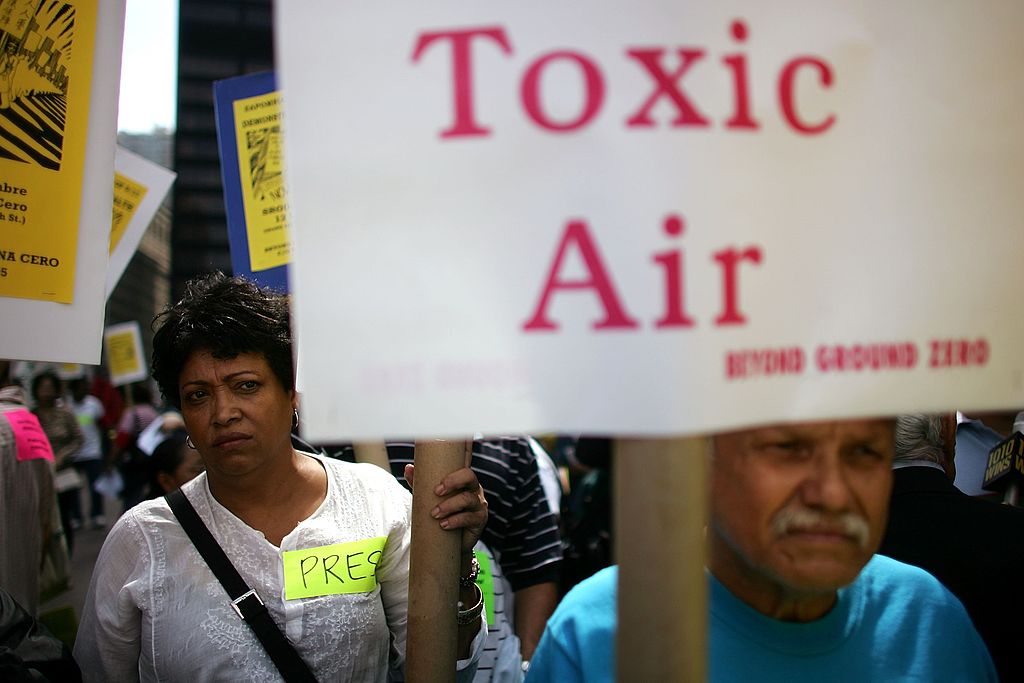After a decade of lobbying and waiting, 9/11 first responders and survivors with uterine cancer can finally get the federal health coverage they’ve long been promised. On Wednesday, U.S. Health and Human Services (HHS) added uterine cancer to the list of conditions covered by the government program that monitors and treats those directly impacted by 9/11.
The decision comes after multiple stories from The Fuller Project and its partners about how women were systemically left out of the government’s World Trade Center Health Program (WTCHP).
Until now, uterine cancer was the only cancer that remained off the list of covered illnesses.
The reason cited was “insufficient evidence” that it was linked to 9/11. But stories run by The Fuller Project and its partners — including Reckon, The Star-Ledger and The Cut — revealed how the lack of data was due to the small number of women included in the early days of the program, which resulted in skewed research samples and excluded conditions that affect women.
“We’re relieved and feel like we can finally exhale, knowing many women will now receive the benefits they deserve,” said Tammy Kaminski, a chiropractor based in West Caldwell, N.J. who volunteered for months at Ground Zero and later developed uterine cancer in 2015.
Following our reporting with Reckon and NJ.com last week, Rep. Frank Pallone (D-N.J.) sent a letter to HHS Secretary Xavier Becerra and WTCHP Administrator John Howard urging them to act. Pallone sits on the House Energy and Commerce Committee with jurisdiction over HHS, and also serves a district where many 9/11 survivors and first responders live. The Fuller Project had also previously covered efforts by Rep. Mikie Sherill, another New Jersey Democrat, to push for more robust coverage for women survivors and first responders.
Shortly after Pallone’s letter, HHS released a final rule that uterine cancer patients could immediately apply for the program, noting that a “delayed effective date would defer the agency’s ability to provide life-saving treatment and result in less favorable treatment outcomes and survival rates for covered individuals.”
For covered illnesses, the WTCHP takes care of all preventive care, disease treatments and follow-ups, with its own physicians, records and insurance program. It estimates more than 200 women who receive coverage from them currently have uterine cancer but are not receiving treatment for the disease through the program. Statistical estimates based on the prevalence of uterine cancer in the country suggest thousands more could be eligible for coverage.
The delay forced women first responders and survivors — anyone who lived, worked, or attended school in and around Ground Zero — to pay for their cancer treatment out of pocket if they didn’t have other insurance that covered it. It also locked them out of the federal health care “Clinical Centers of Excellence” that specialize in Ground Zero carcinogens. Those without federal health benefits were also left out of the linked 9/11 Victim Compensation Fund, which relies on WTCHP enrollment to verify compensation eligibility.
For some, the belated decision brought up mixed feelings.
“I know I should be elated, but instead what came up was the fight to get here,” says Donna Malkentzos, a former New York Police Department detective who worked at the 9/11 debris dump on Staten Island for months, and later developed uterine cancer. “I kind of feel we may have won the battle, but we’re still at war.”
“For me, it took nine years to get here, but what about the women who didn’t have their own coverage? I had to spend a few thousand dollars, but I had it, others didn’t,” says Malketnzos, whose experience was profiled in our most recent story on the topic. “Instead of being happy and elated, it brought up how much we as women don’t have. I don’t want crumbs anymore, I want the whole freaking pound cake.”
Advocates for uterine cancer awareness say the news is an opportunity to spread the information about WTCHP enrollment, but also uterine cancer in general, which is often misdiagnosed or diagnosed late and leads to worse outcomes.
“They were told the air was safe to breathe. They were told their cancer wasn’t caused by 9/11. Now these women can feel vindicated and can access free healthcare that is statistically more likely to extend their lives,” says Matthew Baione, a lawyer who has been one of the earliest advocates for the cancer’s inclusion.



